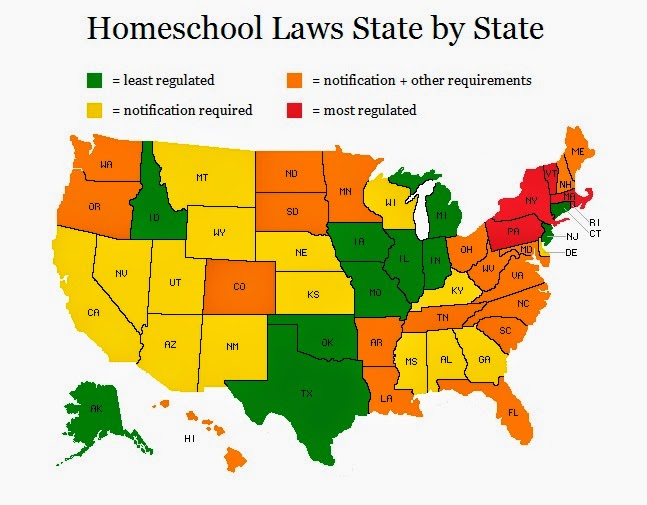Ethics and Legal Issues in the Homeschool Community
Legal issues have a prominent place in the homeschooling community. When I interviewed members of this community, one of the main needs they expressed was the need for information about their state's homeschooling laws. The Home School Legal Defense Association was mentioned time and again, both in interviews and in articles, as a resource for legal information. Since 1993, home education has been legal in all 50 states. However, each state creates its own legislation about how to keep track of homeschoolers. Because of democracy, those state laws can be changed. Therefore, there are at least 50 different legal guidelines for homeschooling, each of which is subject to change. Organizations like HSLDA offer valuable meta-data for homeschoolers who want to abide by the laws of the state in which they live.
Not all homeschoolers, however, feel that they need to answer to the government regarding the education of their children. Parents choose home education for a wide variety of reasons, nevertheless the very nature of homeschooling takes education out of the hands of the government and puts it in the hands of parents. It is certainly possible to carry out home education and not report it to the authorities. As a member of the homeschooling community myself, I have known families who kept a low profile and quietly (and effectively) homeschooled their children. They simply did not want any form of interference from the government about what or how to teach. This sentiment sounds a lot like intellectual freedom. “It is important to resist government intrusion that limits intellectual freedom and access” (Dresang, 2006, p. 188).
As I learned from previous assignments, homeschoolers tend to be avid library users. When these families walk into the library, library staff have no way to know whether the parents have properly registered with the the state as homeschoolers. Regardless, librarians are obligated to provide home educators with the materials that they need. And indeed, homeschoolers depend on us to do so. “An important goal is to maintain the library as a public good, not despite its stance on intellectual freedom but because others understand the importance of this stance” (Dresang, 2006, p. 188). I think it is unnecessary for library staff to know if homeschoolers are abiding by state law. In any case, homeschooling is legal on a national level, so home educating families are within the law in that regard. It is within the scope of the public library to provide information and resources on federal and state homeschool law. But I don’t think that librarians are responsible for what families do with that information. As Krug (2010) says, “the profession strives to enhance the intellectual freedom of the library user by providing not only all materials requested, but also free and equal access to all materials without fear of recrimination for pursuing one’s interest” (p. 2824).
References
Dresang, E.T. (2006). Intellectual freedom and libraries: complexity and change in the twenty-first century digital environment. Library Quarterly, 76(2), 169-192.
Krug, J.F. (2010). Intellectual freedom and the American Library Association (ALA): historical overview. Encyclopedia of Library and Information Sciences, DOI 10.1081/E_ELIS3-120008776
State laws. Retrieved from https://www.hslda.org/laws/default.asp?
Not all homeschoolers, however, feel that they need to answer to the government regarding the education of their children. Parents choose home education for a wide variety of reasons, nevertheless the very nature of homeschooling takes education out of the hands of the government and puts it in the hands of parents. It is certainly possible to carry out home education and not report it to the authorities. As a member of the homeschooling community myself, I have known families who kept a low profile and quietly (and effectively) homeschooled their children. They simply did not want any form of interference from the government about what or how to teach. This sentiment sounds a lot like intellectual freedom. “It is important to resist government intrusion that limits intellectual freedom and access” (Dresang, 2006, p. 188).
As I learned from previous assignments, homeschoolers tend to be avid library users. When these families walk into the library, library staff have no way to know whether the parents have properly registered with the the state as homeschoolers. Regardless, librarians are obligated to provide home educators with the materials that they need. And indeed, homeschoolers depend on us to do so. “An important goal is to maintain the library as a public good, not despite its stance on intellectual freedom but because others understand the importance of this stance” (Dresang, 2006, p. 188). I think it is unnecessary for library staff to know if homeschoolers are abiding by state law. In any case, homeschooling is legal on a national level, so home educating families are within the law in that regard. It is within the scope of the public library to provide information and resources on federal and state homeschool law. But I don’t think that librarians are responsible for what families do with that information. As Krug (2010) says, “the profession strives to enhance the intellectual freedom of the library user by providing not only all materials requested, but also free and equal access to all materials without fear of recrimination for pursuing one’s interest” (p. 2824).
References
Dresang, E.T. (2006). Intellectual freedom and libraries: complexity and change in the twenty-first century digital environment. Library Quarterly, 76(2), 169-192.
Krug, J.F. (2010). Intellectual freedom and the American Library Association (ALA): historical overview. Encyclopedia of Library and Information Sciences, DOI 10.1081/E_ELIS3-120008776
State laws. Retrieved from https://www.hslda.org/laws/default.asp?

Comments